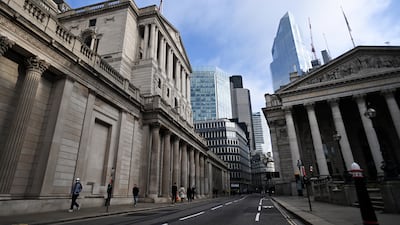The Bank of England defied market expectations by holding interest rates at 0.1 per cent on Thursday - despite growing concerns over rising inflation - causing the pound to dip following the decision.
The Monetary Policy Committee voted by a majority of seven to two to maintain the interest rate, while it also voted by a majority of six to three to stick with its £895 billion stimulus measures.
The pound weakened in the aftermath of the decision, trading 0.87 per cent lower at $1.3568 as of 12:28pm London time.
While the central bank acknowledged that “some modest tightening of monetary policy” was on the cards at recent meetings, it said “near-term uncertainties remain, especially around the outlook for the labour market, and the extent to which domestic cost and price pressures persist into the medium term”.
“At this meeting, the Committee concluded that the existing stance of monetary policy remained appropriate,” the BoE added.
Analysts had widely expected the central bank to increase rates to 0.25 per cent, however, while the bank held rates for now, it added that recent economic data reinforces the view that borrowing costs will have to rise in the “coming months” to keep inflation on target.
The BoE now expects Consumer Price Inflation to reach 5 per cent in April 2022, the highest forecast since 2011 and well above the lender's target of 2 per cent.
Most officials judged that figure to be temporary, and the central bank emphasised that there was little monetary policy could do to prevent the spike, which has been caused by economies reopening after the pandemic as well as soaring energy costs.
Stuart Cole, chief macroeconomist at brokerage Equiti Capital, said the minority vote for an interest rate increase, makes” a December hike a near certainty, barring any unexpected weakening in the labour market”.
The BoE also raised concerns about the outlook for growth, noting signs that consumption is weakening amid supply chain bottlenecks and a surge in the cost of oil, natural gas and electricity.
The committee noted that those issues were holding back the economy, which will linger below its pre-coronavirus level until the first three months of next year, a quarter later than the bank previously expected.
The median estimate for 2022 growth was cut to 5 per cent from 5.3 per cent. That cut came despite a small boost coming from the Treasury after Chancellor of the Exchequer Rishi Sunak lifted spending by £150bn in his annual budget last week.
Mr Cole said the modest drop in the pound after the MPC decision “is probably reflective of the fact that the market was split virtually 50/50 in anticipating a hike today”.
“Whether or not these losses will be recovered quickly will likely in large part depend upon how the market now weighs the expected rate hike to come in December against the message from the BoE that the growth outlook has weakened, suggesting a less aggressive monetary tightening path going forward than was previously being priced in by the market,” Mr Cole added.
The bank’s decision is likely to raise questions about its credibility, in particular Mr Bailey, who allowed speculation for an immediate move in rates to build over the past few weeks
After warning about “hard yards” faced by the economy as recently as the final week of September, Mr Bailey has since focused his remarks about unexpected increases in inflation and the need to control price pressures.
Those remarks had led investors to fully price in rate rise this month, although economists divided almost equally on the likelihood of a move.
Alpesh Paleja, lead economist at the Confederation of British Industry, said the MPC decided “was always going to be on a knife-edge”.
“On balance, the decision to keep interest rates unchanged is the right one. The upcoming rise in inflation will likely prove transitory, and there is as yet only patchy evidence of rising prices becoming embedded in both wage-setting and households’ inflation expectations,” he added.
Just two officials, Dave Ramsden and Michael Saunders, voted for an immediate move in interest rates. They noted inflation is likely to remain above target for the next few years unless rates rise. Acting now might reduce the need for a more abrupt tightening later, they said.
Looking ahead, Mr Paleja said the next few months will be something of a balancing act for the BoE.
“They will need to navigate monetary policy to both curb any signs of price pressures becoming more entrenched, and support the economic recovery from the pandemic,” he said.
“It’s important to remember that any future changes to interest rates will still leave monetary policy very accommodative, with ample scope to support economic growth going forward.”


